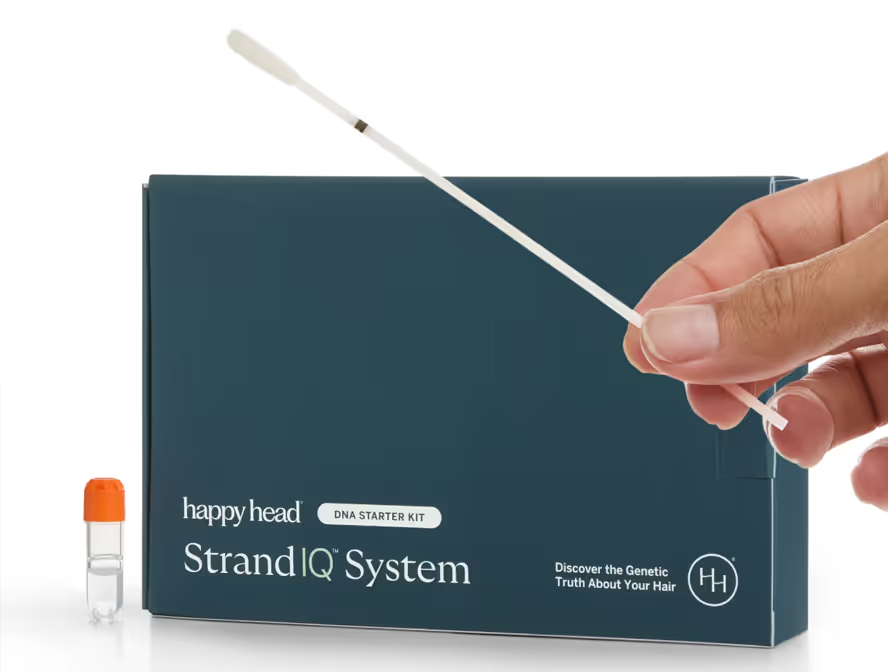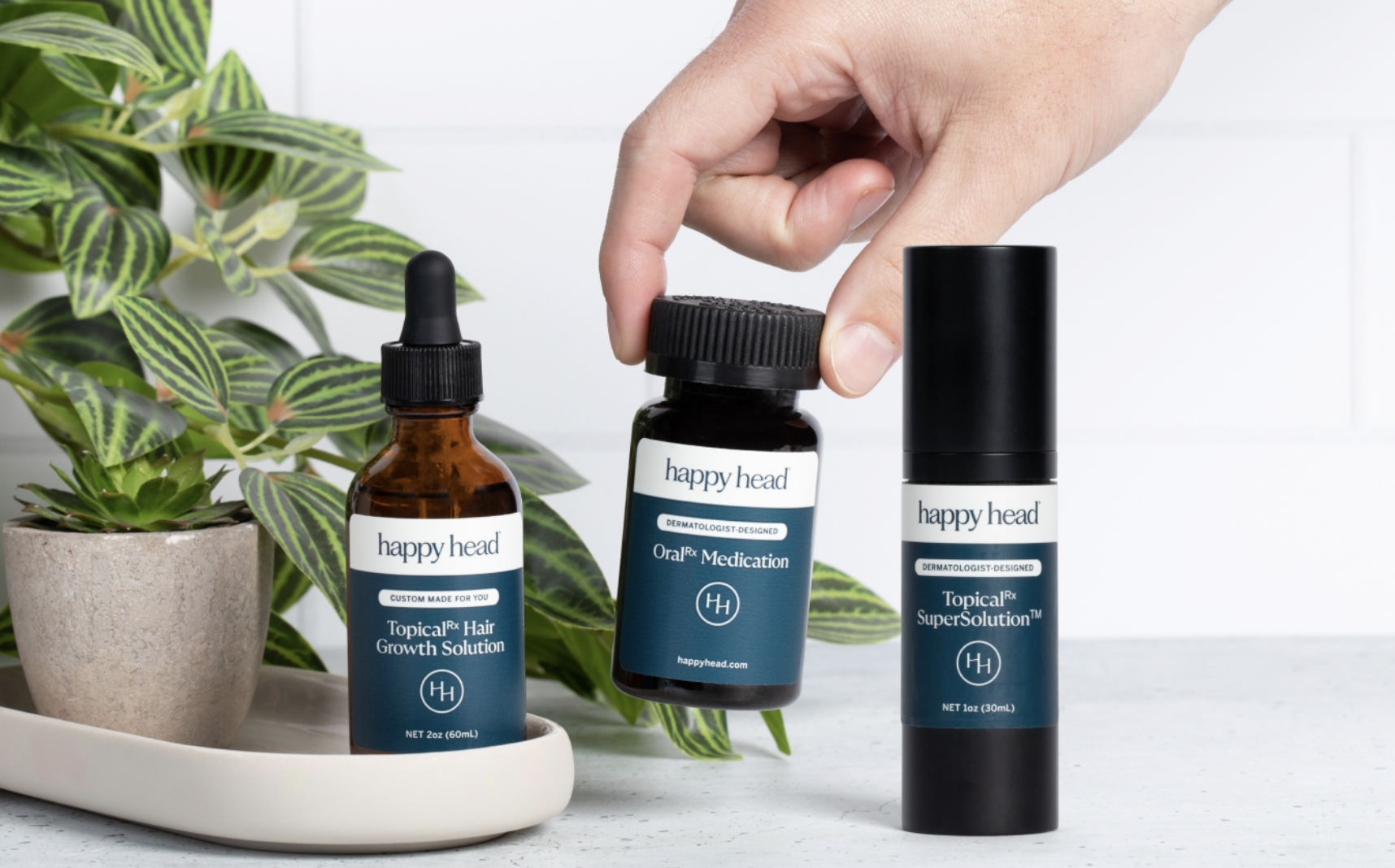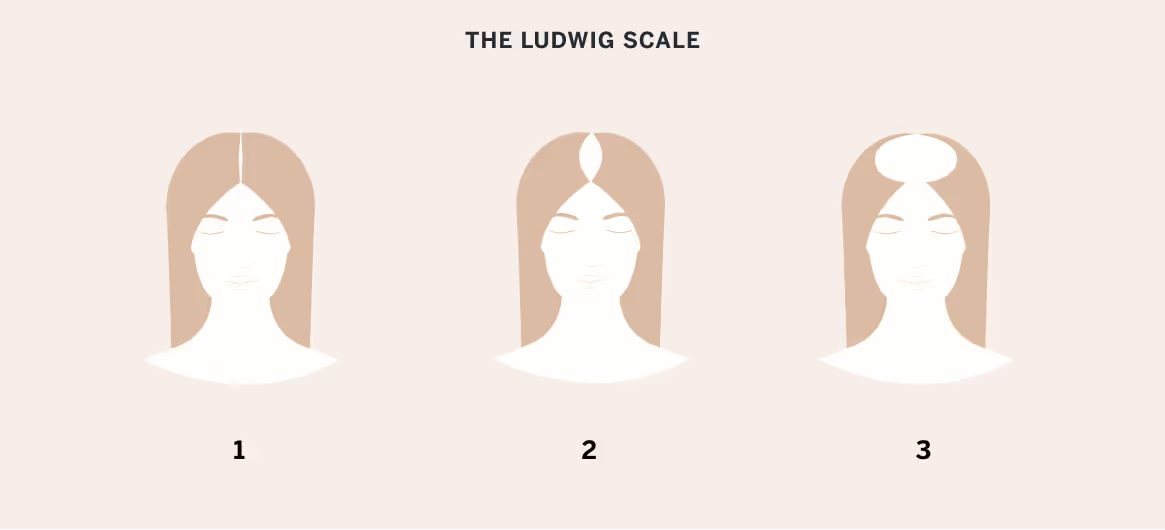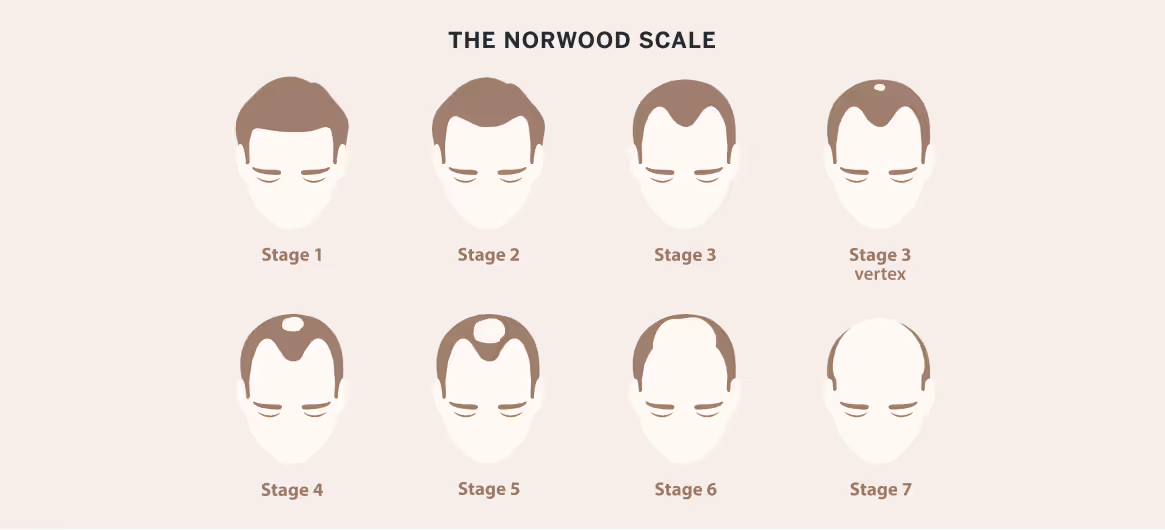Wanting to know more about biotin vs. collagen for hair growth is common for those looking to take a more holistic approach to hair health. Both are integral to the hair growth cycle, but they function in very different ways.
Biotin supports metabolic pathways critical for keratin production, while collagen contributes to the scalp’s structural support system. So, which is right for you? The answer depends on your unique hair loss pattern, age, and nutritional status.
Whether you’re dealing with breakage and hair shedding or you just want stronger, fuller strands, understanding how biotin and collagen work inside the body is the first step to making a smarter, more effective choice for your hair.
Let’s break down the science and help you build a foundation for healthier growth that actually lasts.
Understanding Biotin and Collagen
To make an informed decision about using biotin vs. collagen for hair growth, it's important to understand how each one functions in the body. Both do more than just support healthy hair.
What Is Biotin?
Biotin, also known as vitamin B7, is a water-soluble B-complex vitamin that aids in converting food into energy.
It supports the metabolism of carbohydrates, fats, and proteins and is essential for maintaining healthy skin, nails, and hair. Biotin also contributes to nervous system function and cellular growth.
Although many people get enough biotin through diet, supplementation may be beneficial for those with deficiencies or increased needs, such as during pregnancy or periods of stress.
Signs of Biotin Deficiency
Though rare, a biotin deficiency can lead to noticeable symptoms such as thinning hair, brittle nails, dry skin, and a scaly, red rash, particularly around the eyes, nose, and mouth.
Neurological symptoms such as fatigue, depression, and tingling in the extremities may also occur in more severe cases.
What Is Collagen?
Collagen is the most abundant structural protein in the human body, accounting for nearly 30% of total protein mass.
It forms connective tissue in the skin, bones, tendons, cartilage, and blood vessels, giving these structures strength and elasticity. Collagen is rich in amino acids such as glycine, proline, and hydroxyproline, which support tissue repair and regeneration.
Although the body naturally produces collagen, collagen synthesis declines with age, leading to signs of aging such as wrinkles, joint stiffness, and weakened hair structure.
Signs of Low Collagen
Declining collagen levels can result in sagging skin, wrinkles, joint discomfort, and thinning hair. Nails may become more brittle, and wounds may take longer to heal. Over time, reduced collagen can also contribute to decreased bone density and increased risk of injury.
How Biotin and Collagen Support Hair Growth Naturally
While countless products promise longer, thicker hair, true hair health starts from within. Nutrients such as biotin and collagen are necessary to support the body’s natural hair growth cycle.
These compounds influence how hair is produced, how long it stays in the growth phase, and how resilient it is to environmental and internal stressors. Here's a closer look at the hair growth cycle and the science behind how these nutrients support hair growth.

The Hair Growth Cycle
Hair grows in a continuous cycle with three distinct phases: anagen (growth), catagen (transition), and telogen (resting).
The anagen phase can last several years and is where active hair growth occurs. Catagen is a brief period where growth stops, and telogen is when hair sheds to make room for new strands.
Biotin supports cellular activity during the anagen phase, while collagen helps maintain a healthy scalp and follicle structure across all phases. Disruptions to this cycle, due to stress, nutrition, or illness, can lead to excessive shedding or thinning.
Happy Head’s Hair Growth Supplements contain both biotin and collagen, along with other powerful ingredients such as keratin, saw palmetto, probiotics, ashwagandha, and essential vitamins to support healthier hair growth from within.
How Biotin Impacts Hair Growth
Biotin supports hair growth by aiding the production of keratin, a structural protein that makes up the hair shaft. It is also needed for fatty acid metabolism, which helps nourish the scalp and hair follicles.
Healthy hair follicles are essential for initiating and sustaining the anagen (growth) phase of the hair cycle. While biotin doesn't directly cause hair to grow faster, it helps ensure that the body has the biochemical tools needed to grow strong, resilient strands.
In individuals with low biotin levels, supplementation may help reverse hair thinning and promote regrowth over time. However, more research is needed to determine its effectiveness for those without a deficiency.
How Collagen Helps Hair Grow and Stay Strong
Collagen contributes to hair health by supporting the dermal layer of the scalp, where hair follicles are rooted. It provides structural integrity to the extracellular matrix, helping maintain a firm foundation for hair follicle function.
Collagen is also rich in amino acids such as proline, which is essential for synthesizing keratin. Additionally, collagen’s antioxidant properties may help protect hair follicles from oxidative stress—a key factor in age-related hair thinning.
As collagen production declines with age, supplementing may help improve scalp elasticity and circulation, creating a healthier environment for sustained hair growth.
Biotin and collagen may support hair health, but Happy Head's personalized hair growth solutions are clinically proven and trusted by experts for visible regrowth.
Biotin vs. Collagen for Hair Growth
When it comes to improving hair growth, both biotin and collagen offer unique benefits, but their effectiveness may vary based on individual needs.
Biotin is most effective for those with a deficiency or weak keratin structure, while collagen may better support aging hair by improving scalp structure and follicle anchoring.
While neither is a guaranteed fix for hair loss, both can play supportive roles within a broader hair health strategy that includes nutrition, scalp care, and professional treatment.
Which Works Better for Thinning Hair?
The better option depends on the underlying cause of thinning. Biotin is often more helpful for deficiency-related thinning or brittle hair.
Collagen may be more effective for age-related thinning, as it supports scalp elasticity and follicle structure. Some people may benefit from using both together.
Can Biotin and Collagen Help With Hair Loss?
Biotin and collagen may help with hair loss when part of a holistic approach. Biotin supports keratin production, while collagen reinforces the scalp’s extracellular matrix.
While biotin and collagen can support overall hair health by strengthening existing hair, they may not be enough to treat hair loss caused by genetic factors, hormonal imbalances, or certain medical conditions.
In these cases, it's best to consult with a dermatologist or trichologist to determine the underlying cause and develop an appropriate treatment plan.
Can You Take Biotin and Collagen Together for Hair Growth?
Yes, you can take biotin and collagen together for hair growth. In fact, combining them may provide a synergistic effect by supporting both keratin production and scalp health.
When choosing supplements, look for high-quality, third-party tested products to ensure purity and potency. Start with the recommended dosage and give it at least 3–6 months of consistent use to see results.
Remember that supplements should be used in conjunction with a balanced diet and healthy lifestyle habits for best results.

Happy Head is now offering a hair serum powered by cutting-edge science and natural botanicals with biotin, keratin, and collagen to help boost hair growth without prescription ingredients.
Sources of Biotin and Collagen for Hair Growth
Getting enough biotin and collagen to support hair health can come from diet, supplements, or a combination of both. While the body produces collagen naturally and biotin is found in many everyday foods, aging, stress, and nutrient gaps can make supplementation necessary.
Choosing the right source is key, not just for hair, but for overall well-being. Whether you prefer whole foods or are considering adding a supplement to your routine, knowing where these nutrients come from can help you make an informed choice.
Biotin and Collagen Supplements
Biotin and collagen supplements are widely available in capsules, powders, gummies, and liquids. They’re convenient for those with dietary gaps or increased needs.
Look for third-party tested products with bioavailable forms such as hydrolyzed collagen peptides and D-biotin.
Be aware that high doses of biotin may interfere with lab test results, and collagen may not be suitable for vegans. Always consult a healthcare provider before starting a new supplement, especially if you're pregnant, breastfeeding, or managing a health condition.
Natural Biotin Sources
Biotin occurs naturally in many foods, making it accessible through a balanced diet.
Here are some excellent sources:
- Eggs (especially yolks)
- Liver and other organ meats
- Salmon
- Almonds and walnuts
- Sweet potatoes
- Spinach and broccoli
- Sunflower seeds
- Whole grains and legumes
- Mushrooms
- Avocados
Including a variety of these foods regularly can help maintain healthy biotin levels without supplementation.
Natural Collagen Sources
While collagen itself is only found in animal products, certain foods can support the body’s natural collagen production.
Good sources include:
- Bone broth
- Chicken skin
- Fish (with skin)
- Egg whites
- Gelatin
- Beef and pork cuts with connective tissue
- Foods rich in vitamin C ( citrus, berries, bell peppers, etc.)
These foods provide the amino acids and cofactors needed to support collagen synthesis.
Lifestyle Tips To Support Hair Growth Naturally
In addition to a nutrient-rich diet, certain lifestyle habits can help support healthy hair growth. Here are some tips:
- Manage stress: High levels of stress can contribute to hair loss. Practice stress-reducing techniques such as meditation, deep breathing, or yoga.
- Get enough sleep: Aim for 7–9 hours of quality sleep per night to support overall health and hair growth.
- Stay hydrated: Drinking plenty of water helps maintain scalp hydration and supports healthy hair growth.
- Be gentle with your hair: Avoid harsh treatments, excessive heat styling, and tight hairstyles that can damage hair and lead to breakage.
- Scalp massage: Gently massaging your scalp can improve blood circulation and stimulate hair follicles for healthier growth.
When To Consult a Professional
If you’re experiencing sudden, excessive, or unexplained hair thinning, it’s time to consult a dermatologist who specializes in hair loss.
While nutrients such as biotin and collagen can support hair health, they may not be enough if an underlying condition, such as androgenetic alopecia, telogen effluvium, thyroid dysfunction, or scalp inflammation, contributing to hair loss.
A board-certified dermatologist can perform a comprehensive evaluation, order appropriate lab tests, and recommend evidence-based treatments tailored to your diagnosis.
These may include prescription topicals, oral medications, in-office procedures, or compounded therapies not available over the counter.
Early intervention often leads to better outcomes, so don’t wait until hair loss becomes severe. A professional can help you create a treatment plan that addresses the root cause and supports long-term regrowth.
Biotin vs. Collagen for Hair Growth: Which Is Right for You?
Biotin supports keratin production and is most effective for those with a biotin deficiency. If you suspect a biotin deficiency, talk to your healthcare provider about getting tested. They can recommend an appropriate dosage based on your needs.
Collagen provides the building blocks for keratin and helps maintain scalp health and prevent thinning. Collagen supplements are particularly helpful for those over 30, as collagen production naturally declines with age.
If you're experiencing significant hair loss or thinning, it's always best to consult with a dermatologist or trichologist to determine the underlying cause and develop a personalized treatment plan.
Hair growth is a gradual process, and it may take several months to see noticeable results. Be patient and consistent, and take a holistic approach to support your hair's natural growth cycle.
When it comes to choosing biotin vs. collagen for hair growth, both can be beneficial depending on your individual needs—with the right combination of nutrients, lifestyle habits, and targeted treatments, you can achieve stronger, healthier hair from the inside out.
Talk to a board-certified dermatologist to discuss your goals and find the solution that is best for you.
Frequently Asked Questions
Which is better for your hair, collagen or biotin?
Biotin supports keratin production, which is essential for hair strength, while collagen helps improve hair follicle health and strengthen hair. The better option depends on the root cause of your hair concerns—both can be beneficial in different ways.
Which supplement is best for hair growth?
There’s no one-size-fits-all supplement for hair growth. Biotin may help if you’re deficient, while collagen can support overall follicle health and scalp integrity. A dermatologist can help determine which supplement, if any, fits your specific hair needs.
Can too much biotin or collagen cause hair loss?
Biotin and collagen are generally safe when taken as directed. However, excessive biotin may interfere with lab tests, and too much collagen could cause mild digestive issues. Neither typically causes hair loss, but it’s best to follow dosing guidelines and consult a doctor.
Can collagen help regrow thinning hair?
Collagen may help slow thinning by supporting the scalp’s structure and providing amino acids needed for healthy hair production. While it’s not a cure for hair loss, it can complement other treatments by promoting a healthier environment for hair growth.












